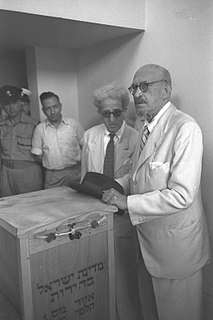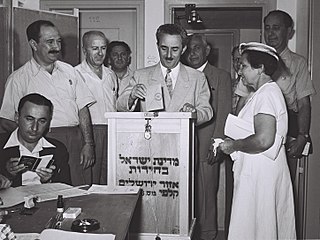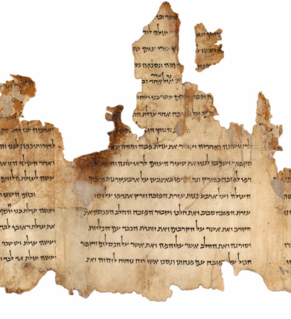Rafi was a center-left political party in Israel, founded by former Prime Minister, David Ben-Gurion in 1965. In 1968 it was one of three parties that merged to form the Israeli Labor Party.

Elections for the second Knesset were held in Israel on 30 July 1951. Voter turnout was 75.1%.
The United Religious Front was a political alliance of the four major religious parties in Israel, as well as the Union of Religious Independents, formed to fight the 1949 elections.

Elections for the third Knesset were held in Israel on 26 July 1955. Voter turnout was 82.8%.
Hapoel HaMizrachi was a political party and settlement movement in Israel and is one of the predecessors of the National Religious Party, which later became the modern-day Jewish Home Party.
Poalei Agudat Yisrael was a trade union and Jewish political party in Poland, and was a minor political party in Israel. It was also known as PAI or PAGI, its Hebrew acronym.
Mizrachi was a political party in Israel and is one of the ancestors of the modern-day Jewish Home Party.
Elections for the fifth Knesset were held in Israel on 15 August 1961. Voter turnout was 81.6%.

Aharon Zisling was an Israeli politician and minister and a signatory of Israel's declaration of independence.

Dov Yosef was an Israeli statesman. He served as military governor of Jerusalem during the 1948 Arab–Israeli War. He held ministerial positions in nine Israeli governments.

The first government of Israel formed by David Ben-Gurion on 8 March 1949, a month and a half after the elections for the first Knesset. His Mapai party formed a coalition with the United Religious Front, the Progressive Party, the Sephardim and Oriental Communities and the Democratic List of Nazareth, and there were 12 ministers.

The second government of Israel was formed during the first Knesset. David Ben-Gurion made an attempt to form a minority government consisting of Mapai and Sephardim and Oriental Communities on 17 October, but it was not approved by the Knesset. Two days later President Chaim Weizmann asked Progressive Party leader Pinchas Rosen to form a government, but it was Ben-Gurion who finally managed to do so on 1 November 1950. The coalition partners were the same as in the first government: Mapai, the United Religious Front, the Progressive Party, the Sephardim and Oriental Communities and the Democratic List of Nazareth.

The fifth government of Israel was formed by Moshe Sharett during the second Knesset on 26 January 1954, and was the first government not led by David Ben-Gurion. Sharett kept the same coalition partners as during the fourth government, i.e. Mapai, the General Zionists, the Progressive Party, Mizrachi, Hapoel HaMizrachi, the Democratic List for Israeli Arabs, Progress and Work and Agriculture and Development.

The seventh government of Israel was formed by David Ben-Gurion on 3 November 1955 following the July 1955 elections. His coalition included Mapai, the National Religious Front, Mapam, Ahdut HaAvoda, and the Israeli Arab parties, the Democratic List for Israeli Arabs, Progress and Work and Agriculture and Development.

The eighth government of Israel was formed by David Ben-Gurion on 7 January 1958, and was the second government of the third Knesset. Ben-Gurion kept the same coalition partners as during the previous government, i.e. Mapai, the National Religious Party, Mapam, Ahdut HaAvoda, the Progressive Party, the Democratic List for Israeli Arabs, Progress and Work and Agriculture and Development. The only change to the cabinet was the addition of Shlomo-Yisrael Ben-Meir as a Deputy Minister.

The tenth government of Israel was formed on 2 November 1961 following the August elections. Although David Ben-Gurion was appointed Prime Minister, the government was actually formed by Minister of Finance, Levi Eshkol. On 7 September Ben-Gurion had told President Yitzhak Ben-Zvi that he was unable to form a government; on 14 September Ben-Zvi asked Eshkol to form a government, with Eshkol subsequently announcing that he would do so with Ben-Gurion as PM. It turned out to be the last government led by Ben-Gurion.

The eleventh government of Israel was formed on 26 June 1963, midway through the fifth Knesset. It was the first government formed by Levi Eshkol following the second resignation of David Ben-Gurion.

Bechor-Shalom Sheetrit was an Israeli politician, minister and the only signatory of the Israeli declaration of independence to have been born in the country. He served as Minister of Police from independence until his death in 1967, making him the longest-serving cabinet member in the same portfolio to date.

Kiryat HaMemshala, also known as Kiryat Ben-Gurion, is the government precinct of the State of Israel. It is located in the Givat Ram neighborhood of Jerusalem.
Ahdut HaAvoda was the name used by a series of political parties. Ahdut HaAvoda in its first incarnation was led by David Ben-Gurion. It was first established during the period of British Mandate and later became part of the Israeli political establishment. It was one of the forerunners of the modern-day Israeli Labor Party.












